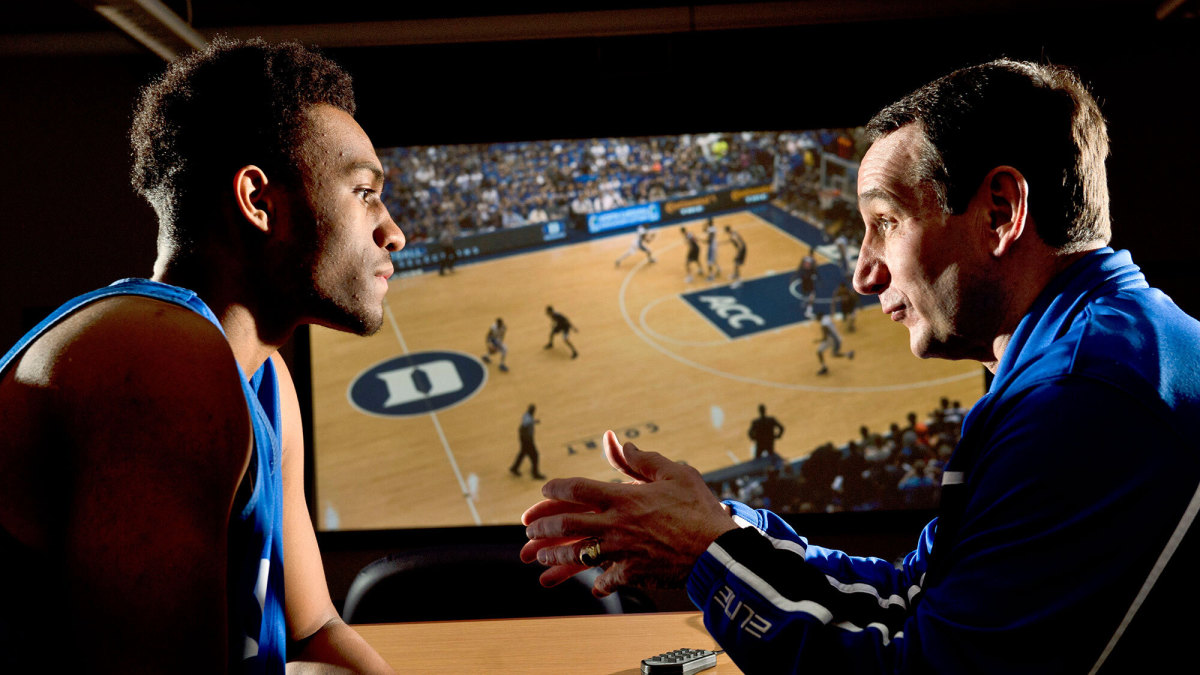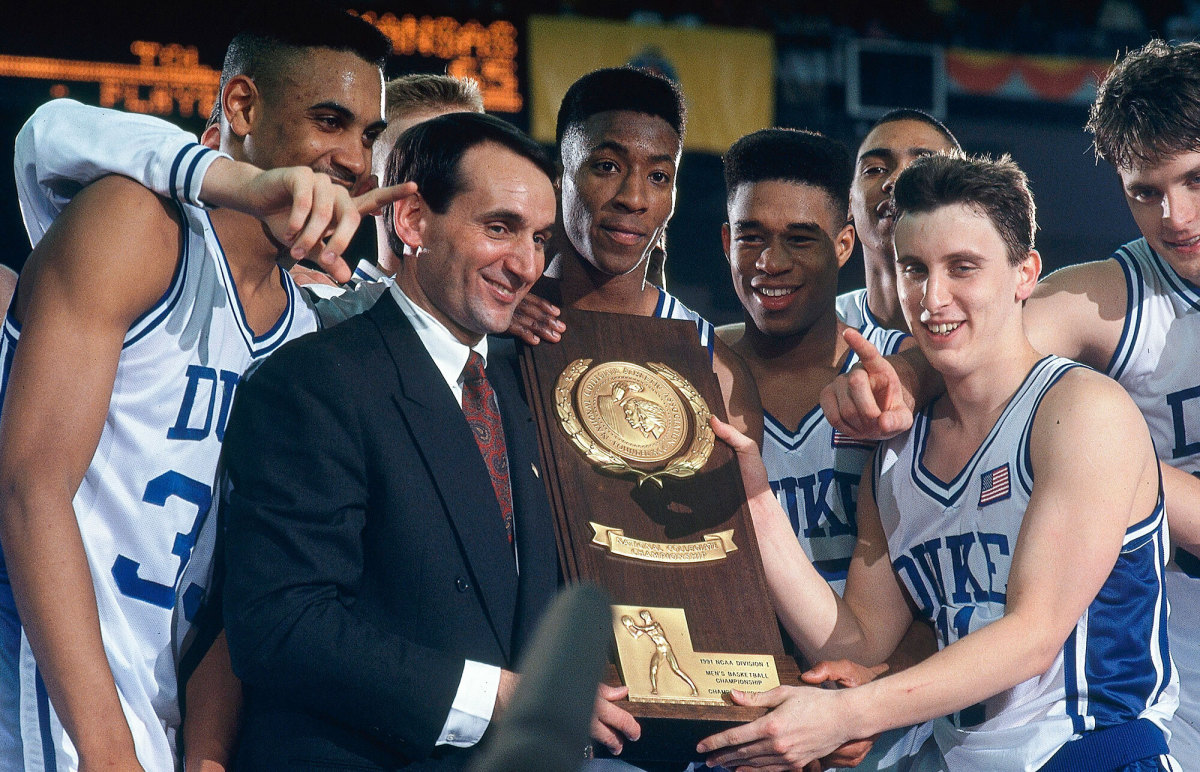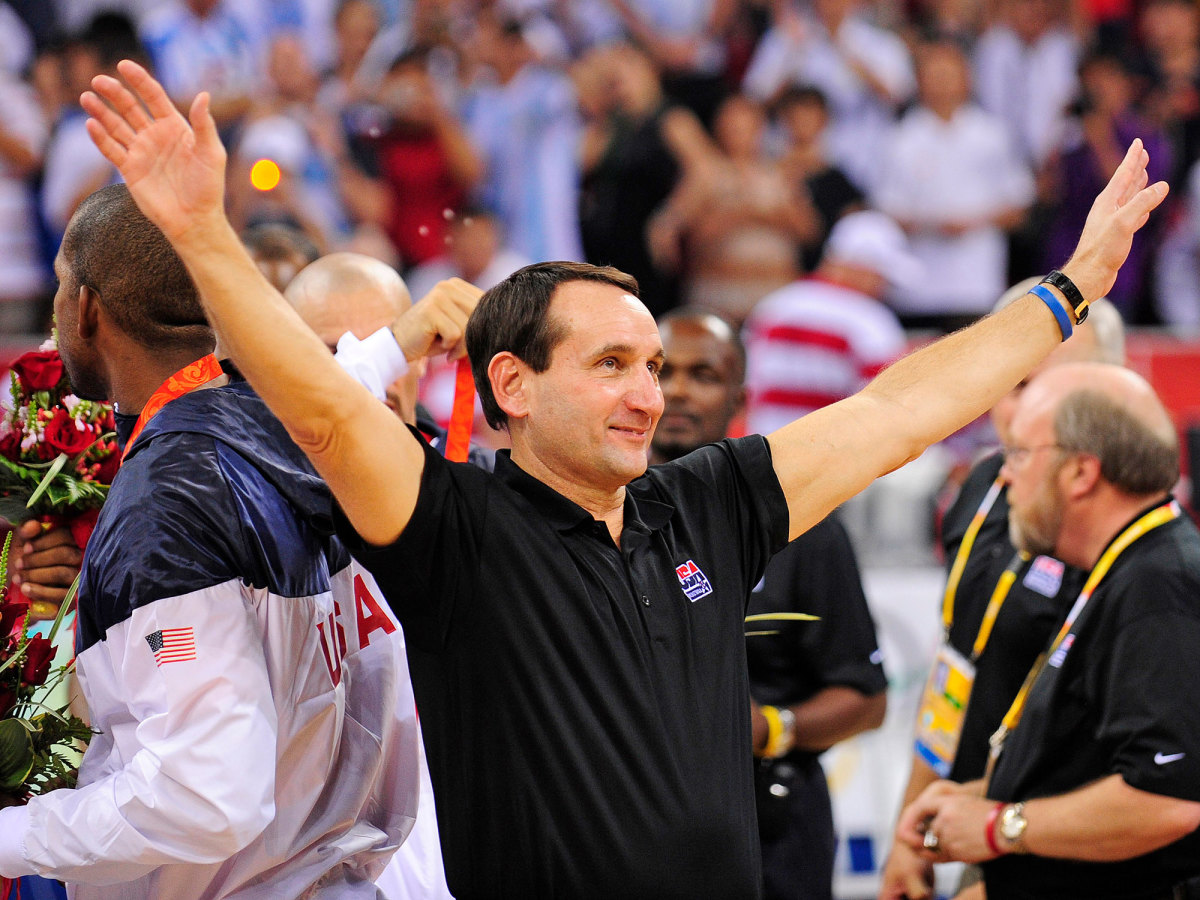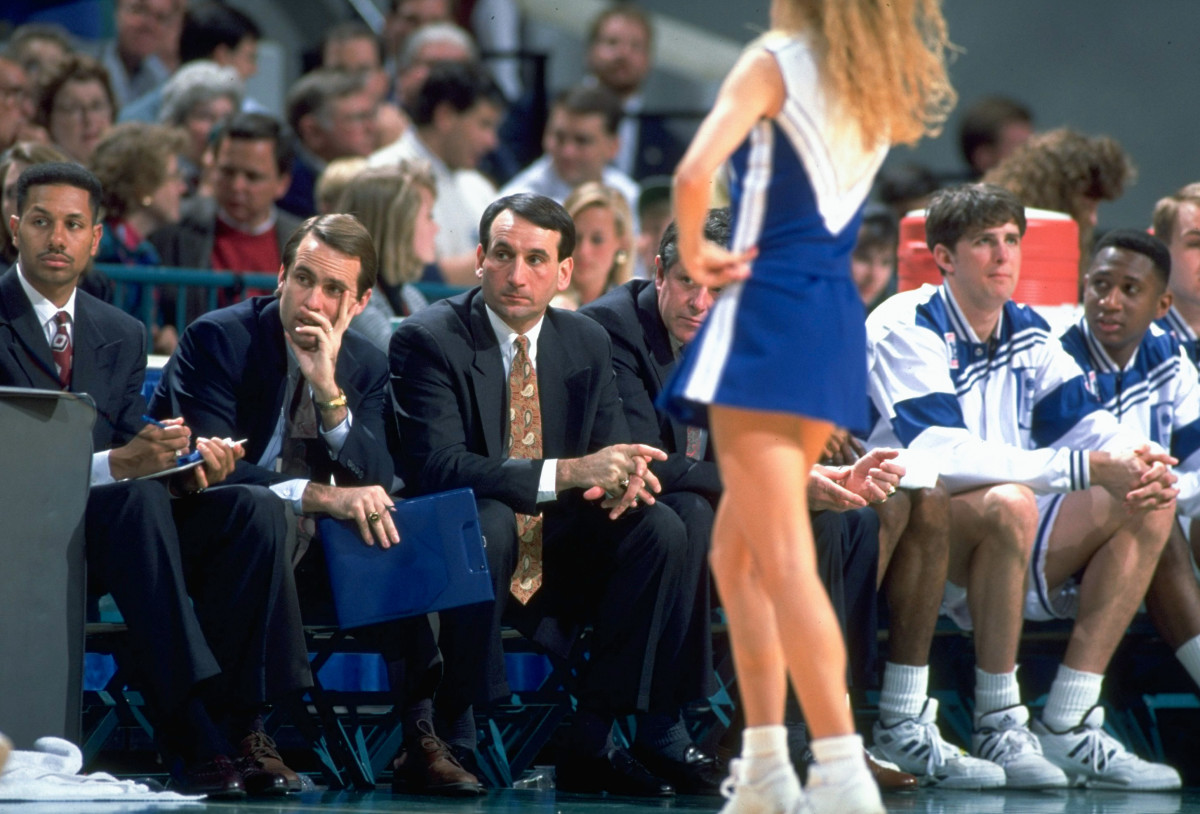The Best of Sports Illustrated’s Coach K Coverage
The end of Mike Krzyzewski’s illustrious coaching career is nearing. On Saturday, the Duke coach will be on the sideline for the final time at Cameron Indoor Stadium as his Blue Devils host rival UNC. Next will come Coach K’s final ACC tournament, and then, of course, his last NCAA tournament, where Duke will look to send him off as a national champion.
Sports Illustrated has had vast coverage of Krzyzewski’s head coaching career, which began in 1975 at Army before he took over in Durham in 1980, and included time in charge of USA Basketball. As Coach K says goodbye to college basketball, we’re rounding up the best of our stories about the legendary coach and the program he built.
Every Sports Illustrated Duke Cover Under Coach K

Features
March 16, 1992: Blue Angel (by Alexander Wolff)
Leaving the neighborhood was Krzyzewski’s first big step. Even in the late 1960s, one didn't do it lightly. Polish-Americans gave one another copious amounts of love and support, but for those who struck out on their own and did no better than muddle through, there was much I-told-you-so clucking back along Damen Avenue. “You could go to college,” Krzyzewski remembers, “but you couldn't go away to college.”
Feb. 22, 1999: No More Mr. Nice Guys (by Tim Crothers)
So focused is Krzyzewski on emotions that during practice the day after a 22-point win at Clemson on Jan. 20, he reviewed a game tape with his players that included no action, only their confident and passionate faces. By all accounts Coach K’s own zeal has returned to a level not seen since the beginning of the decade. On the eve of the Jan. 27 home game against North Carolina, Krzyzewski spoke inside Cameron Indoor Stadium to the mob of students who had been sleeping outside in tents for the better part of a month to get the choicest seats. “If you’re not going to be intense,” Coach K said, “then don't f------ show up.”
Nov. 21, 2005: The Duke Way (by Grant Wahl)
For the next hour the only music in Cameron is MC Krzyzewski laying down the smack: “You freshmen are so damn loose with the ball. That’s ridiculous. Pass the ball like you’re passing to men, not little boys.... Greg, don’t throw that pass. That’s a lazy pass. That’s why you have six turnovers today.... The reason you guys turn the ball over so much is because you don’t talk.... You have not been competing the last 20 minutes. You want the white shirts to kick your ass right now.”
Summitt and Krzyzewski: 2011 SI Sportspersons of the Year (by Alexander Wolff)
Indeed, the two share so many things that they deserve to be studied, not just honored, jointly. Both grew up in working-class homes so full of obligation that the very idea of want never got a hearing. Both labored for years (12 for her, 15 for him) before winning a national title. Both have nested their programs so naturally into their universities that among the more than 200 athletes who have exhausted their eligibility at Duke or Tennessee, virtually none has failed to graduate.
Feb. 24, 2014: The Education of Jabari Parker (by Jeff Benedict)
Mike Krzyzewski wore a dark-blue suit and tie when he approached the front door of Jabari Parker’s South Side home at 7 p.m. In less than 48 hours Parker would reveal his college choice on national TV. Duke was the front-runner. Coach K had come to close the deal.
Feb. 15, 2022: Coach K, the Team Builder (by Michael Rosenberg)
This sounds so basic as to be unremarkable. But Krzyzewski’s success does not come from what he does with X’s and O’s. It is his ability to shape people into a team—to understand that the last man on the bench might be at the center of the social circle, that the guy playing the best might not be playing hardest, that one player who is struggling might need encouragement while another who is struggling needs to be chewed out. Every interaction matters.

National championships
1991: Yes! (by Alexander Wolff)
Thus Krzyzewski’s task—to ensure that the end didn't come too soon—became easier. For an instant after its 79–77 semifinal defeat of previously unbeaten UNLV on Saturday, Duke lost all composure. Hurley confessed that he “acted like a fool,” leaping on the back of a teammate. Moments later the Devils received their coach's counsel. “An ordinary team would be satisfied beating UNLV,” Krzyzewski told them in the locker room, “but an ordinary team won't win on Monday.”
1992: Hurley Burly (by Curry Kirkpatrick)
That it turned out to be so difficult for the young Wolverines was as much attributable to the technology and leadership of Krzyzewski as it was to the maturity and spirit of his players. “This is the greatest year I've ever had...just incredible coaching these guys,” said Coach K, who at the championship moment Monday night surely must have thought back to the week before, when Laettner lifted Duke from the precipice of certain defeat against Kentucky.
2001: Three’s the Charm (by Alexander Wolff)
Upon seeing him at tournament time, his brother, Bill, a Roykoesque fireman from Chicago, usually tells him, “You look like s---.” On Thursday, however, when they met at the team's hotel, Bill said, “You know, Mike, you look good.” Balancing family with basketball, Krzyzewski has found an equipoise that kept him fresh enough to reinvent his team following a 91–80 loss to Maryland at home on Feb. 27 in which center Carlos Boozer suffered a stress fracture in his right foot. The injury appeared to have ended Boozer’s season and reduced an essentially six-man team to five. It had been Senior Night at Cameron Indoor Stadium, and as a cake to celebrate what would have been Battier's 122nd victory sat uneaten in a corner of the locker room, every player but Battier, ever the stoic, hung his head. A few shed tears.
2010: Tough as They Come (by Tim Layden)
Duke’s performance was emblematic of a team that finished 35–5 and won with toughness rather than style. Before the game Krzyzewski wrote four words on a whiteboard in the locker room: STRONG. TOGETHER. TALK. CRASH. (As in the boards.) It was the language of effort. The Blue Devils won not just because Hayward's last shot bounced away but also because Singler (a junior wing who switched from power forward just this year, as the team was transformed) was the one player whom Butler couldn’t stymie ... “We’ve developed and grown together,” said Singler. “This is going to last forever.”
2015: Deal With the Devils (by Michael Rosenberg)
Krzyzewski and his assistants stayed up until 5 a.m. after the Miami game, trying to plan their next move. The head coach finally suggested something that for him was once borderline heresy: Let’s play some zone. Proposing a switch to Carolina blue uniforms might have been more stunning—but only a little bit. ... A new blueprint was being drawn. This Duke team would never be as refined as a veteran group like Wisconsin. But its coaches would find ways to hide the rough edges and allow the players’ athleticism and skill to take over.

Team USA
2008: Sweet Redemption (by Alexander Wolff)
Coach K also bristles at the suggestion that the ‘06 team took things lightly, insisting that it just wasn't up to the task. “It’s perfectly fine to say you’re not good enough,” he says. “The question is, What do you do to be good enough?” At practice the day before the gold medal game Krzyzewski was asked if he thought his team was now good enough to win the gold. “I think we’re humble enough to do it,” he replied.
2016: Coach K’s Team USA Impact Runs Deeper Than Gold (by Michael Rosenberg)
The Americans made this look easy against Serbia. O.K., maybe it was easy against Serbia. But instilling pride in the program was not easy. Some people don’t like NBA players playing in the Olympics. There are NBA executives who worry their stars will get hurt in an event that does not properly compensate the NBA or its players. The Mavericks’ Mark Cuban has been vocal about this. You can be sure that some agents worry, too. Krzyzewski got his players to believe.
2022: ‘That’s Probably the First Time LeBron Has Been Talked to That Way’ (by Ian O’Connor)
As he prepared Team USA—the Redeem Team, as it was known—Krzyzewski understood he was no longer in Durham. He knew he couldn’t expect his players to adapt to him. He had to adapt to them. That was evident during an exhibition game against Lithuania, in Seoul, before the 2006 world championship tournament in Japan. Krzyzewski ripped into Magic center Dwight Howard, who had skipped college and had become the No. 1 pick in the ’04 draft, for the way he was (or wasn’t) defending the pick-and-roll. “It wasn’t personal,” says Shane Battier, who played for the coach at Duke and on that U.S. team in ’06. “But this is the way Coach K is. You could tell Dwight Howard was not used to having many people talk to him like this. The look on Dwight’s face was, Who the hell are you?

Miscellaneous
1992: The Shot Heard Round the World (by Alexander Wolff)
As they outdid each other with each successive play, Duke and Kentucky may have invented one more criterion for a great game, a standard beyond import, excellence or drama. “People who saw it knew it was a great game,” says Mike Krzyzewski, the Blue Devils’ coach. “They didn't need any announcer or sports-writer to tell them it was. And not only Duke fans and Kentucky fans felt that way. Any basketball fan who saw it felt disbelief that any of it could happen.”
1995: Coach K Talks Price of Success, Return to Courtside (by Alexander Wolff)
“I spent the time away doing a lot of analysis of why I do certain things. I talked with many people—my wife, Mickie, especially—and asked myself, Why did you do that? Do you still believe this? And I concluded that I like to coach. I like to teach. And I don't do it because I like these tropical storms that keep coming in. People around you get accustomed to your getting it all done, even when things get out of hand.”
1995: An Unrivaled Rivalry (by Alexander Wolff)
Krzyzewski recounts how once, after a North Carolina victory over Duke, a gang of students followed his eldest daughter, Debbie, through the halls of her junior high school in Durham, bumping and taunting her to tears. Even teachers joined in, writing “Go Heels!” in the margins of papers before returning them to her. “I can live with losing to any school,” Krzyzewski says. “But what would happen in this area peoplewise if one of us beat the other in the [national] championship game I wouldn’t wish on anybody, it would be so horrible.”
2015: Before He Was Coach 1K (by Seth Davis)
“I considered Stanford and Notre Dame, but there was something about Coach K that really intrigued me. When he talked to me, he would literally have goose bumps on his arms. He was so much more passionate about his vision than any other coach who came into my living room.”
2021: There Will Never Be Another Like Coach K (by Pat Forde)
Krzyzewski is a massive winner who somehow managed to be both a traditionalist and a cutting-edge agent of change—the guy who figured out how to connect with generations of players from Danny Ferry to Zion Williamson. He went from being the coach who somehow had Grant Hill play four years of college to the coach who traded as heavily as any in the one-and-done market—most recently having a player turn pro after 13 games as a Blue Devil. He’s been the smartest of coaches, the toughest of coaches, at times the most imperious of coaches.
2022: Coach K’s Senior Day Finally Arrives (by Pat Forde)
At the final pre-North Carolina press conference of his incredible career, Krzyzewski walked himself through it, thinking out loud. He acknowledged that the reality started to hit—this is it, the 648th and final contest here, the culmination of a symbiotic relationship between a man and a building that has become synonymous with the passion of the college game. The collegians who play and cheer in Cameron never age, but the coach is now 75 and Saturday is an ending that is both a long time coming and arriving quite suddenly.
More College Basketball Coverage:
• Dan and Bob: A Basketball Bromance
• Duke Ends Longest ACC Title Drought Under K
• Dickie V Can’t Be Silenced
